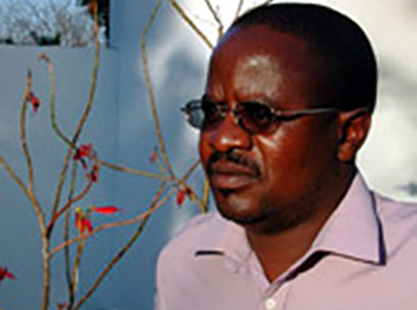

MDC-T organising secretary Abednico Bhebhe has said President Robert Mugabe’s Cabinet reshuffle resembled the 2002 war Cabinet that was aimed at retrogression and wrecking the economy through fighting the West and curtailing human freedoms of Zimbabweans.
BY SILAS NKALA
Communicating through his blog, Bhebhe said Mugabe, with his degrees of failure, should at least show cause that he is in touch with reality and concerned about suffering people of Zimbabwe by appointing ministers with energy and skills to turn around the economy.
Mugabe on Monday reshuffled Cabinet ministers which saw Ignatias Chombo who was in Local Government, Public Works and National Housing being appointed in Home Affairs. Kembo Mohadi, former Home Affairs minister became State Security minister.
Saviour Kasukuwere former Environment, Water and Climate minister took over from Chombo. Jonathan Moyo, former Information Media and Broadcasting minister was appointed Higher and Tertiary Education minister taking over from Oppah Muchinguri Kashiri who was moved to head Environment, Water and Climate portfolio.
Mugabe appointed Nyasha Chikwinya as Women’s Affairs minister and Prisca Mupfumira as acting Information minister.
Bhebhe said under normal circumstances, the market reacts after any Cabinet reshuffle, underlying how serious an issue it is for any country.
“In Zimbabwe, it was business as usual on Monday after Mugabe recycled the same old career ministers expecting Zimbabwe to move forward,” Bhebhe said.
- Chamisa under fire over US$120K donation
- Mavhunga puts DeMbare into Chibuku quarterfinals
- Pension funds bet on Cabora Bassa oilfields
- Councils defy govt fire tender directive
Keep Reading
“The mini-Cabinet reshuffle, like many others before it, does not inspire any confidence – actually it is demoralising coming at a time when the economy is grinding to a halt.”
He said this reshuffle would not bring new skills or technocrats and removed any hope of the recycled ministers performing any new miracles to revive the economy.
“They are old at the same time only interested in enriching themselves or adept at improving Zanu PF’s balance sheet and keeping that party in power,” Bhebhe said. “The entire career ministers in Mugabe’s Cabinet have proven beyond a reasonable shadow of doubt that they are just plain inept and incompetent and best at only causing the suffering of the masses and looting State resources.”
Bhebhe said Mugabe’s reshuffle shows the 91-year-old leader was only interested in dealing with infighting in Zanu PF and managing succession dynamics in his party – everything else would secondary or unnecessary.
“One would have expected Mugabe to show Zimbabweans, depending on whom he chose, whether the government would regress, stagnate or move towards reform and consolidation of some of the positive gains of the GNU (Government of National Unity),” he said.
“But alas, the mini-reshuffle is symbolic of the oxymoronic situation where the way forward could be stated as being backwards by recycling the same deadwood as part of Zanu PF’s reward /patronage system to entrench its hold on power. It reminds us of that 2002 war Cabinet, that was retrogressive, wrecking the economy, fighting the West and curtailing human freedoms of Zimbabweans as enshrined in the Constitution.”
Bhebhe said Chombo had been in the Local Government Ministry for the past 15 years and all he was known for was Operation Murambatsvina, fighting MDC councils and abusing his ministry to grab vast tracts of land and housing stands.
“His appointment to the Home Affairs Ministry scares human rights defenders, ordinary Zimbabweans and the opposition as he is one man who (with his behaviour as a Local government minister) cannot hesitate to send the police to harass and beat people – all in the name of defending Mugabe as a ‘thank you’ for keeping him in his Cabinet.
Kasukuwere as an Indigenisation minister scared many would-be investors with his threats to grab their assets and companies under the guise of ensuring 51% black empowerment act was followed.”
Bhebhe said and now as a Local Government minister, it would not be surprising to see him with his combative style, fighting local authorities, disrupting or meddling in their affairs the way Chombo did.
“In a nutshell, it’s a political war Cabinet with nothing new to offer,” he said.
In 2002 Mugabe, then 78, appointed what he called war Cabinet which was aimed at fighting the opposition MDC, Britain and its allies as well as the country’s economic problems. This saw him sacking Finance minister Simba Makoni and 50 ministers and deputies taking oath of office. Makoni was replaced by Herbert Murerwa.
Hardliners who kept their posts included Agriculture minister Joseph Made, who headed chaotic and often violent seizures of white-owned farms, and Information minister Jonathan Moyo, architect of new media laws that saw at least 12 journalists arrested and charged. Militant Justice minister Patrick Chinamasa, led a reform of the judiciary, also remained in office.
The State-owned Zimbabwe Broadcasting Corporation quoted Mugabe as saying his new team would fight opposition from Britain and its allies as well as the country’s economic problems.Addressing the media after a swearing-in ceremony, President Robert Mugabe described the new Cabinet as “a fully-fledged war council set to fight the country’s economic problems”.
He described the Cabinet as a political war Cabinet which will take into account actions being taken by Britain and its allies against Zimbabwe.










